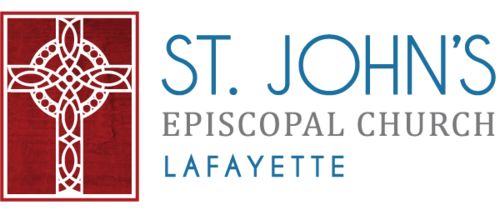A message from Ben McCartney
Good morning everybody! My name is Ben McCartney and I’ve been attending St. John’s on and off again for the last thirty years.
Most recently, I’ve been coming with my wife Cathleen since she graciously agreed to move with me back to Lafayette so that I could be an assistant professor of finance at Purdue.
Now, if there’s anything that junior faculty love it’s a captive audience, no time limit, and only very vague guidelines as to what should be talked about.
So, in a fun turn of events, the stewardship committee have asked that I talk to you today about what St. John’s means to me, why I attend, and why Cathleen and I share our resources with it.
I’ve been saying the chorister’s prayer for almost as long as I can remember. It goes like this:
“Bless oh lord, us they servants, who minister in thy temple. Grant that what we sing with our lips we may believe in our hearts. And what we believe in our hearts we may show forth in our lives.”
I love the prayer because of the “we” – what “we” sing with our lips.
Don’t get me wrong, I love playing the organ. For an introvert like me, it’s nice not having to track down twenty other people to play a symphony. But there’s something about making music with a group that’s really special. And it’s more than just the music itself. Working together to create anything, no matter what it is, is rewarding and fills me with hope and optimism.
But working together is hard. Choir is one thing – we’re all on basically the same page, and we’ve willingly ceded control to an expert who can guide us and teach us – at least when we’re not skipping.
But when people have radically different views or values or goals, working together is a struggle. It can be frustrating to watch dysfunction and feel somewhat hamstrung in what I can do. In how I can give of myself to a group to create something or solve some problem.
And the solutions to all of the big problems are going to require teamwork and coordination.
An econ colleague recently presented the twitterverse with a scenario. They were going zip lining and while getting strapped in were asked by the instructor what they did and they said, “I’m an economist”. The instructor said, “Oh cool, what’s the one thing I should know about economics?” The colleague reports that they couldn’t think of what to say and so posed the question to us, what should I have said?
My favorite response suggested this. It said: “you should have told him the fundamental theorem of economics,” – reminder: that’s the one that says free markets work because of an invisible hand coordinating economic activity such that people can be completely self-interested, but society can still achieve some optimal outcome. So the response said, “you should have told him the fundamental theorem of economics, but then ziplined away without telling him the assumptions.”
And it’s a great, funny response, because for a lot of people that is the one thing they know about economics. They know about the invisible hand, but not the underlying assumptions.
When we learn physics, we start by assuming a vacuum and we talk about a block on a frictionless table. Similarly, the starting point in econ is to assume a frictionless world. But there are two really important frictions that the invisible hand theorem assumes away that I want you to know:
First: the theorem assumes that everybody knows everything and everybody knows that everybody else knows everything. We say there’s no asymmetric information, everybody is on the same page.
The second assumption is that there are no transaction costs, no sort of “extra” costs. There’s no time spent going to store, no stigma for paying with food stamps, no fees to pay a lawyer or real estate agent. And remember you don’t even need a lawyer or realtor because you and everybody else already knows everything.
So when you’re asked to think about how well the free market allocates resources in a particular setting, ask yourself if (1) people operating in that market have different amounts of information or (2) if they face costs to trading. (Hint, in almost all cases they do, on both counts.)
To be clear, no economist thinks that these are anything other than simplifying assumptions. They are clearly violated in the real world. They’re useful to us because they give a baseline, they give us a starting point and then we can begin to add frictions – like information asymmetry and transaction costs – back into the model and see what happens.
But there are many people who use the free market theorem as a justification for not sharing. Who say, there’s no need for us to work together to solve this problem, the invisible hand will take care of it.
And it makes me angry and it makes me frustrated and then it makes me sad when I hear this line of reasoning.
But then I come here. And work together with this group of people to make music. And then join with all of you in singing about: “What faith can gain when faithful people are undaunted and hope, even in conflict, is sustained”. And it’s incredible, and calming, and inspiring.
Here at St. John’s, the chorister’s prayer reminds me every week that I am part of a “we.”
Grant that what we sing with our lips, we may believe in our hearts. And what we believe in our hearts, we show forth in our lives. Amen.
For more information about the 2020 Annual Campaign, visit the St. John's website or contact the church office at 765.742.4079.


